-
 Bitcoin
Bitcoin $115000
0.12% -
 Ethereum
Ethereum $3701
4.50% -
 XRP
XRP $3.081
2.99% -
 Tether USDt
Tether USDt $0.0000
-0.01% -
 BNB
BNB $767.9
1.45% -
 Solana
Solana $169.5
3.13% -
 USDC
USDC $0.9999
0.01% -
 Dogecoin
Dogecoin $0.2106
4.30% -
 TRON
TRON $0.3334
1.62% -
 Cardano
Cardano $0.7564
2.54% -
 Stellar
Stellar $0.4165
0.76% -
 Hyperliquid
Hyperliquid $38.75
0.25% -
 Sui
Sui $3.593
3.00% -
 Chainlink
Chainlink $17.08
3.59% -
 Bitcoin Cash
Bitcoin Cash $573.6
4.35% -
 Hedera
Hedera $0.2508
-0.84% -
 Avalanche
Avalanche $23.07
6.46% -
 Ethena USDe
Ethena USDe $1.001
-0.02% -
 Litecoin
Litecoin $120.8
8.17% -
 UNUS SED LEO
UNUS SED LEO $8.943
-0.32% -
 Toncoin
Toncoin $3.400
-5.60% -
 Shiba Inu
Shiba Inu $0.00001255
1.54% -
 Uniswap
Uniswap $9.908
6.32% -
 Polkadot
Polkadot $3.718
2.10% -
 Monero
Monero $303.0
-0.74% -
 Dai
Dai $0.9999
-0.02% -
 Bitget Token
Bitget Token $4.392
0.91% -
 Cronos
Cronos $0.1403
6.31% -
 Pepe
Pepe $0.00001076
1.13% -
 Aave
Aave $267.2
1.80%
Why does Coinbase suddenly require re-verification of identity?
Coinbase prompts re-verification for compliance checks, unusual activity, or system updates, requiring users to confirm identity via ID uploads or biometric scans.
Jun 13, 2025 at 12:42 pm
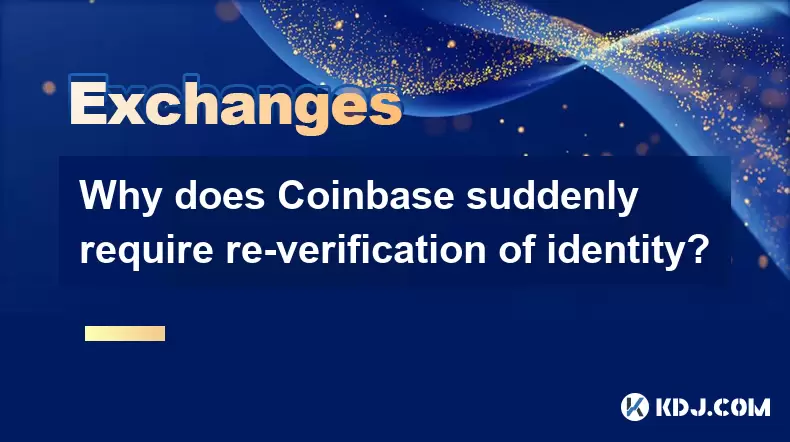
What Triggers Coinbase's Re-Verification Process?
Coinbase, as one of the most regulated cryptocurrency exchanges in the United States, operates under strict compliance with financial regulations. When users see a prompt for re-verification, it typically stems from internal compliance checks or external regulatory requirements. These triggers may include unusual account activity, changes in personal information, or updates to government databases used for identity verification.
Additionally, Coinbase employs automated systems that periodically review user accounts to ensure ongoing compliance with KYC (Know Your Customer) and AML (Anti-Money Laundering) laws. If any discrepancies are found — such as mismatched identification documents or outdated information — the system may flag the account for manual review, prompting the need for re-verification.
How Does Regulatory Compliance Influence Identity Checks?
Cryptocurrency platforms like Coinbase must adhere to various legal frameworks, including those enforced by the Financial Crimes Enforcement Network (FinCEN), the Securities and Exchange Commission (SEC), and other international bodies. Regulatory guidelines require platforms to maintain up-to-date user records and conduct periodic reviews to prevent fraud, money laundering, and identity theft.
In response to evolving global regulations or new directives from these agencies, Coinbase may update its verification protocols and initiate re-verification campaigns across large segments of its user base. This ensures that all active accounts meet the latest compliance standards and helps protect both the platform and its users from potential legal and financial risks.
Can Account Activity Prompt a Re-Verification Request?
Yes, certain activities within an account can lead to automatic re-verification requests. For instance, sudden increases in trading volume, frequent withdrawals, or transfers to high-risk jurisdictions may raise red flags in Coinbase’s monitoring systems. In such cases, the platform may require additional documentation to confirm the legitimacy of transactions and the identity of the account holder.
Other activities that may trigger this process include:
- Changing the registered email address
- Updating phone numbers or physical addresses
- Attempting to access features previously restricted due to insufficient verification
These measures are part of Coinbase’s broader risk management strategy designed to maintain a secure and compliant trading environment.
Technical and System Updates That Require Identity Confirmation
From time to time, Coinbase performs backend upgrades or integrates new security technologies to enhance platform safety. Following such updates, especially those involving identity verification infrastructure, the platform may request users to re-validate their identities. This ensures that the new systems accurately reflect user data and maintain continuity in compliance efforts.
For example, if Coinbase migrates to a more advanced document scanning tool or enhances facial recognition software, older verification records may not be compatible with the updated system. As a result, users might receive prompts to re-upload identification documents or complete biometric checks to align with the latest verification standards.
Steps to Complete Re-Verification on Coinbase
If you receive a notification asking for identity re-verification, follow these steps carefully:
- Log into your Coinbase account and check the banner or email notifications for instructions.
- Navigate to the Identity Verification section under your account settings.
- You will likely be prompted to upload a government-issued ID, such as a passport or driver’s license.
- Ensure that the image is clear, well-lit, and shows all four corners of the document.
- In some cases, you may also be asked to take a selfie holding the ID to match facial features.
- Review the uploaded documents for clarity and accuracy before submitting.
- Wait for the verification team to review your submission — this can take anywhere from a few minutes to several business days depending on volume.
During this period, certain features of your account may be temporarily restricted until verification is confirmed. Avoid uploading expired or altered documents, as doing so may delay the process or result in account suspension.
Frequently Asked Questions
Why did I get a re-verification request if I haven’t made any changes to my account?
Coinbase conducts routine audits and system-wide compliance checks. Even if no changes were made by you, the platform may initiate re-verification to align with updated regulatory standards or system upgrades.
Will re-verification affect my crypto holdings or transaction history?
No, re-verification does not impact your digital asset balances or transaction history. It only affects access to certain features until completed successfully.
Is there a way to expedite the re-verification process?
While there is no official "fast track," ensuring that your documents are valid, unexpired, and clearly photographed can help speed up processing. Submitting during off-peak hours may also reduce wait times.
Can someone else verify my account on my behalf?
No, identity verification must be conducted by the account owner using their own identification documents. Any attempt to use another person’s ID or delegate this task may result in account restrictions or permanent suspension.
Disclaimer:info@kdj.com
The information provided is not trading advice. kdj.com does not assume any responsibility for any investments made based on the information provided in this article. Cryptocurrencies are highly volatile and it is highly recommended that you invest with caution after thorough research!
If you believe that the content used on this website infringes your copyright, please contact us immediately (info@kdj.com) and we will delete it promptly.
- Bitcoin, Fed Rate Cut, and Crypto Stocks: A New Yorker's Take
- 2025-08-05 14:50:12
- Police, Cryptocurrency, Bitcoin Windfall: Unexpected Gains and Cautionary Tales
- 2025-08-05 15:30:12
- MAGACOIN: The Next Shiba Inu ROI? A Crypto Presale Deep Dive
- 2025-08-05 15:30:12
- Bitcoin, Kiyosaki, and the August Curse: Will History Repeat?
- 2025-08-05 14:50:12
- Crypto Airdrops: Your August 2025 Guide to Free Tokens & Opportunities
- 2025-08-05 13:45:13
- Luxury Dining Reimagined: St. Regis Singapore & Marriott's Culinary Celebration
- 2025-08-05 13:45:13
Related knowledge
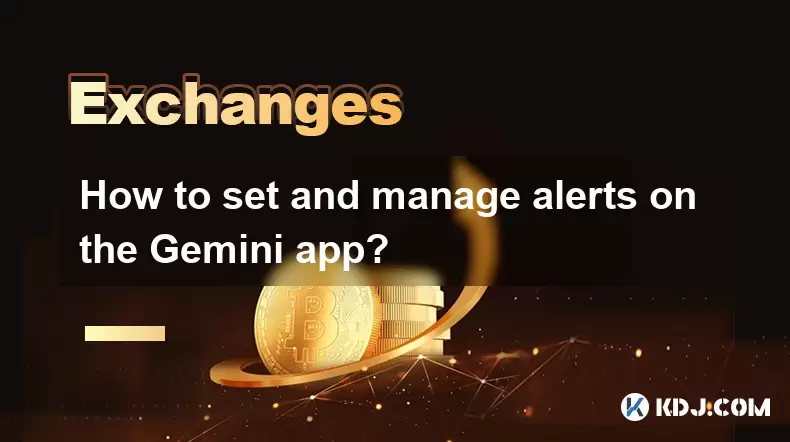
How to set and manage alerts on the Gemini app?
Aug 03,2025 at 11:00am
Understanding the Gemini App Alert SystemThe Gemini app offers users a powerful way to stay informed about their cryptocurrency holdings, price moveme...
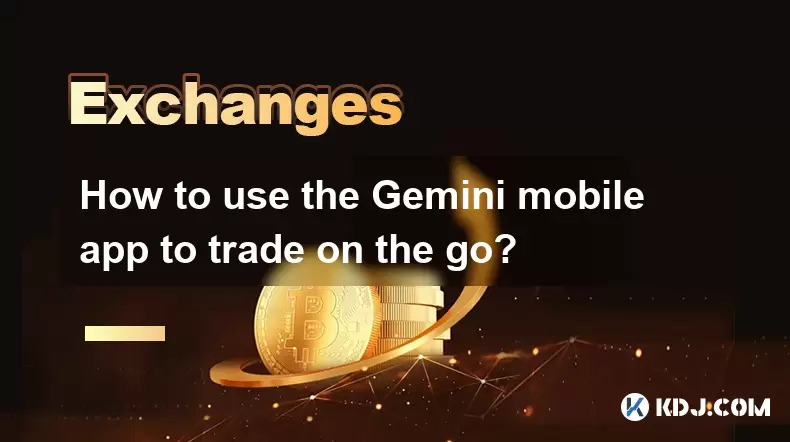
How to use the Gemini mobile app to trade on the go?
Aug 04,2025 at 09:14am
Setting Up the Gemini Mobile AppTo begin trading on the go using the Gemini mobile app, the first step is installing the application on your smartphon...

How to set up a corporate account on Gemini?
Aug 05,2025 at 03:29pm
Understanding Gemini Corporate AccountsGemini is a regulated cryptocurrency exchange platform that supports both individual and corporate account crea...
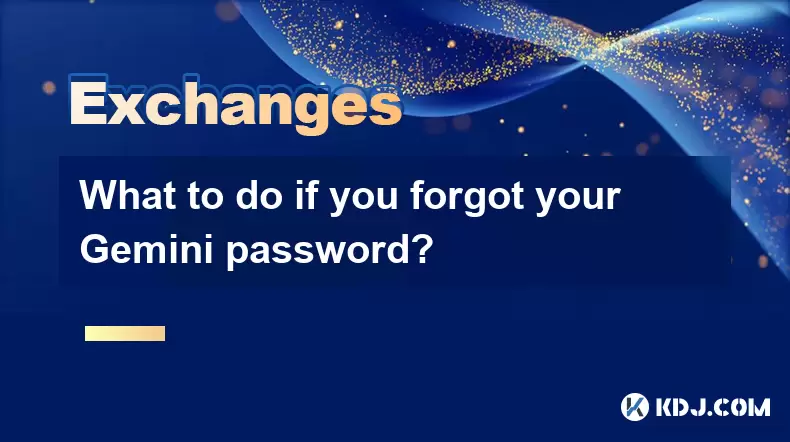
What to do if you forgot your Gemini password?
Aug 04,2025 at 03:42am
Understanding the Role of Passwords in Gemini AccountsWhen using Gemini, a regulated cryptocurrency exchange platform, your password serves as one of ...
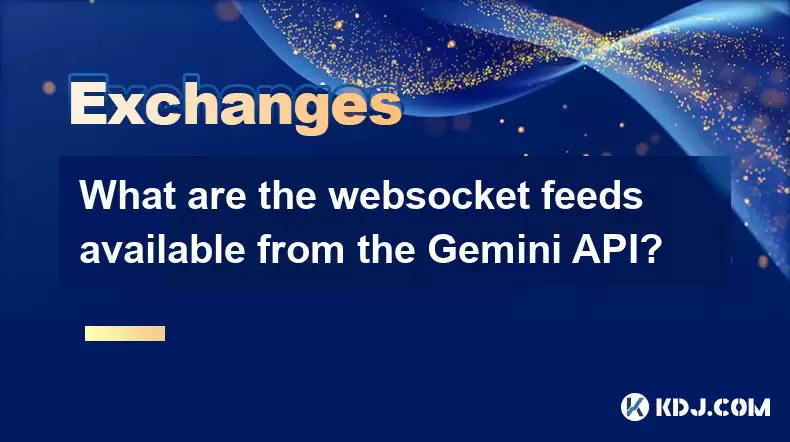
What are the websocket feeds available from the Gemini API?
Aug 03,2025 at 07:43pm
Overview of Gemini WebSocket FeedsThe Gemini API provides real-time market data through its WebSocket feeds, enabling developers and traders to receiv...
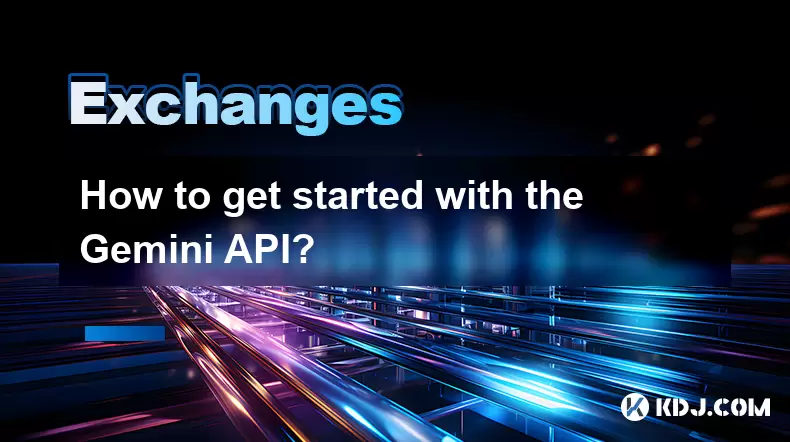
How to get started with the Gemini API?
Aug 05,2025 at 12:35pm
Understanding the Gemini API and Its PurposeThe Gemini API is a powerful interface provided by the cryptocurrency exchange Gemini, enabling developers...

How to set and manage alerts on the Gemini app?
Aug 03,2025 at 11:00am
Understanding the Gemini App Alert SystemThe Gemini app offers users a powerful way to stay informed about their cryptocurrency holdings, price moveme...

How to use the Gemini mobile app to trade on the go?
Aug 04,2025 at 09:14am
Setting Up the Gemini Mobile AppTo begin trading on the go using the Gemini mobile app, the first step is installing the application on your smartphon...

How to set up a corporate account on Gemini?
Aug 05,2025 at 03:29pm
Understanding Gemini Corporate AccountsGemini is a regulated cryptocurrency exchange platform that supports both individual and corporate account crea...

What to do if you forgot your Gemini password?
Aug 04,2025 at 03:42am
Understanding the Role of Passwords in Gemini AccountsWhen using Gemini, a regulated cryptocurrency exchange platform, your password serves as one of ...

What are the websocket feeds available from the Gemini API?
Aug 03,2025 at 07:43pm
Overview of Gemini WebSocket FeedsThe Gemini API provides real-time market data through its WebSocket feeds, enabling developers and traders to receiv...

How to get started with the Gemini API?
Aug 05,2025 at 12:35pm
Understanding the Gemini API and Its PurposeThe Gemini API is a powerful interface provided by the cryptocurrency exchange Gemini, enabling developers...
See all articles

























































































